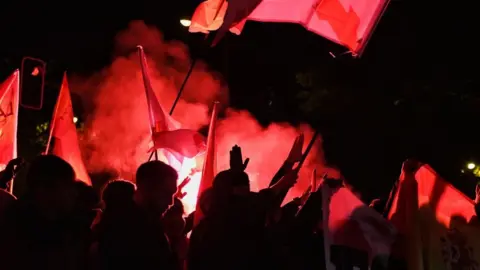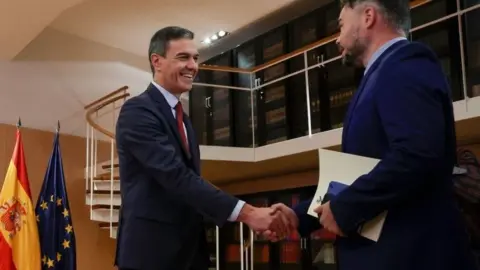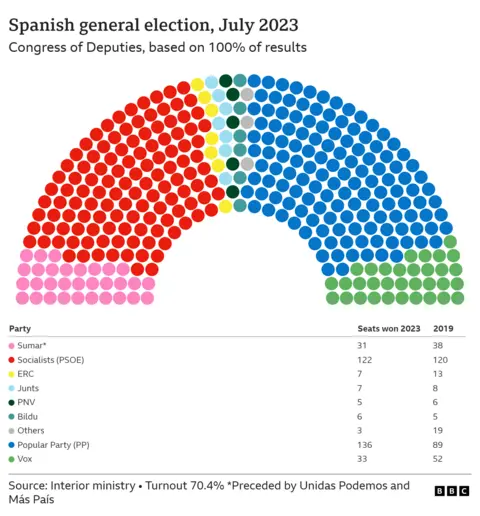Spanish fury at Pedro Sánchez' controversial amnesty plan for power
 Europa Press News
Europa Press NewsDaily right-wing protests against Spain's acting prime minister Pedro Sánchez have become increasingly violent.
They highlight mounting tensions as he attempts to negotiate a controversial amnesty law.
About 7,000 demonstrators gathered outside Mr Sánchez's Socialist party headquarters in Madrid on Tuesday.
He is preparing for an investiture vote which is expected to see him form a new government and avoid a repeat election.
That can only happen if he can secure the parliamentary support of Catalan separatists.
As police and protesters clashed on Tuesday night, Mr Sánchez posted a defiant message on social media: "They will not break the Socialist Party."
Similar protests have been taking place in the Spanish capital and in other cities on a daily basis recently, although this was the most violent so far, with 29 police and 10 demonstrators getting injured.
The Socialists were runners-up in July's general election, behind the conservative People's Party (PP). However, PP leader Alberto Núñez Feijóo failed to form a government in an investiture vote in September, receiving only the support of the far-right Vox out of the main parties.
It is now Mr Sánchez's turn and he is close to securing enough parliamentary support to form a new administration in coalition with left-wing alliance Sumar.
In order to win the investiture, he needs the backing of an array of regional parties, including the pro-independence Together for Catalonia (JxCat) and the Catalan Republican Left (ERC).
In exchange for their support, those two parties have demanded an amnesty for several hundred Catalan politicians and activists who face legal action mainly for activities linked to a failed bid to secede from Spain in 2017.
 PIERRE-PHILIPPE MARCOU
PIERRE-PHILIPPE MARCOUHaving agreed with ERC on the content of the amnesty bill, Socialist representatives are still locked in talks with JxCat, delaying the investiture vote.
Among those who would benefit from the law is Carles Puigdemont of JxCat, the former Catalan premier who led the independence bid six years ago and who has been living in Belgium ever since, out of reach of the Spanish judiciary.
Mr Sánchez has presented the amnesty as the latest of several measures by his government aimed at calming tensions in Catalonia linked to the territorial issue.
In 2021, his administration issued pardons for nine leaders who had been jailed for their part in the failed secession bid; it subsequently revised the penal code to eliminate the crime of sedition and alter the crime of misuse of public funds, changes which benefitted Catalan separatist leaders.
Previously, Mr Sánchez had deemed an amnesty - which has been a long-standing demand of many pro-independence Catalans - unconstitutional, making this the biggest and most contentious policy pivot of his career.
The right-wing opposition has accused the Socialist leader of using the amnesty purely to ensure his own political survival. It has also argued that the initiative violates the constitution and encourages Catalan separatists to make another attempt to secede, thus threatening Spain's territorial unity.
Former PP prime minister José María Aznar described Mr Sánchez as "a danger for Spanish constitutional democracy" while Mr Núñez Feijóo said the amnesty was "democratic madness". Both have called on their supporters to take to the streets to protest against the initiative.
Although the PP did not organise the demonstrations which have been taking place outside Socialist Party buildings recently, it was slow to condemn them.
"The social unrest is the fault of [Pedro Sánchez]," Mr Núñez Feijóo posted on social media, before declaring on Wednesday that "violence does not have a space in democracy".
Santiago Abascal, leader of the far-right Vox party, has called for a "permanent, constant and growing mobilisation" against the amnesty and called on police officers to disobey "illegal" orders from their superiors during protests.
Mr Abascal and other Vox leaders have been present at the Madrid protests, where other far-right groups have been identified.
Although Socialist Party members have voted to endorse the deal with ERC and JxCat, in a ballot which did not specifically mention the amnesty, several senior party veterans have broken ranks and also spoken out against the initiative.
Felipe González, a former Socialist prime minister, said the amnesty threatened to "destroy social peace" in Spain by giving convicted Catalan politicians special treatment.
The political schism over the amnesty has been echoed in the judiciary.
Conservative members of the General Council of the Judiciary (CGPJ), a supervisory body, approved a motion warning that "democracy, fundamental liberties and the rule of law could be in danger." Left-leaning members of the body voted against the motion while one boycotted the session altogether.

